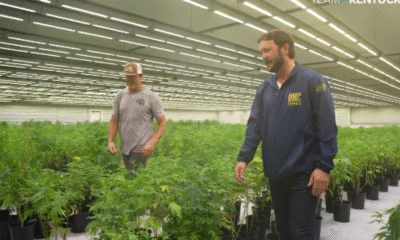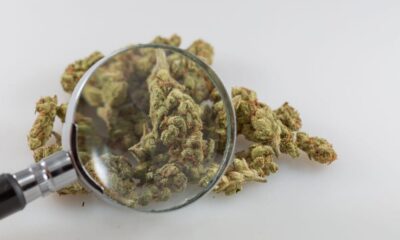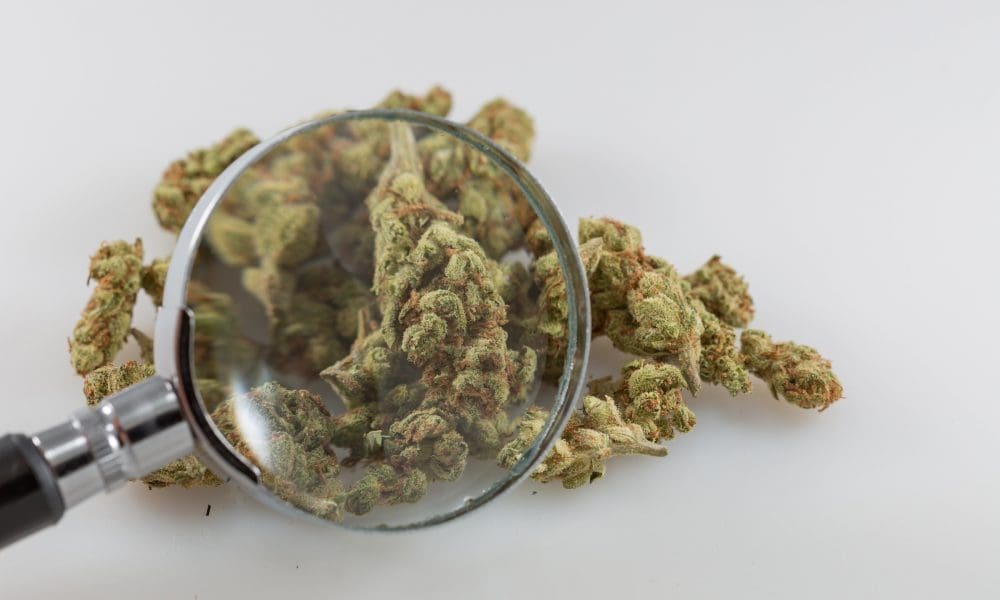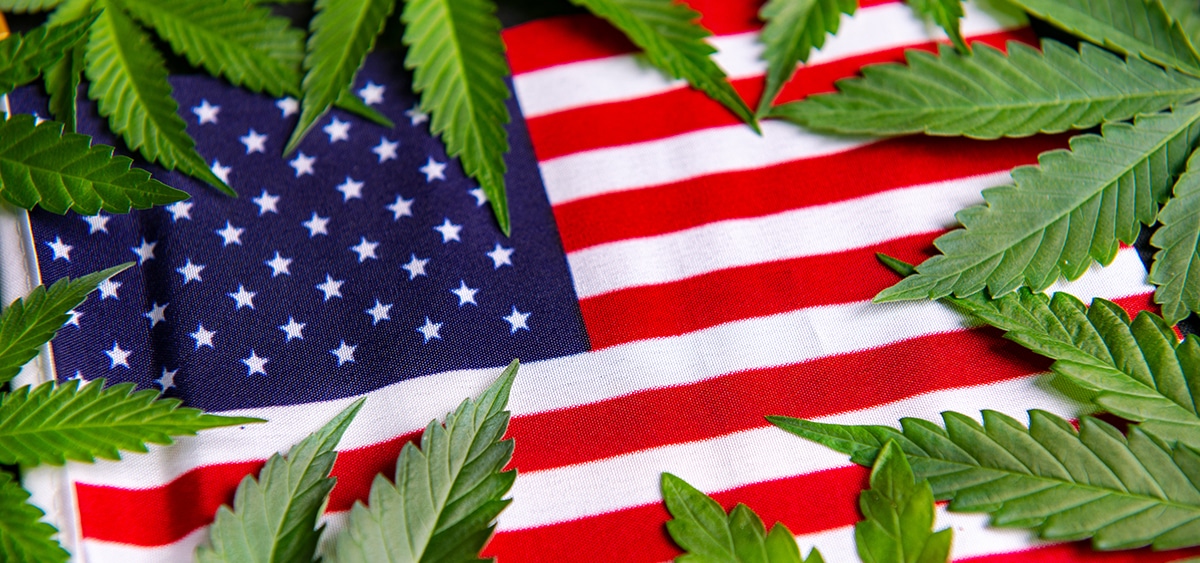Federal researchers at the National Institute of Standards and Technology (NIST) say they’ve made the first-ever detection of THC in human breath following the consumption of infused edibles—a possible step forward in terms of field testing for cannabis impairment.
But more research is necessary, they add, pointing to “uncertainty of breath measurements” and the need to further analyze the detectability of cannabinoids over longer time periods.
“This is an important step forward, that we can detect THC increases in breath after the ingestion of cannabis,” Jennifer Berry, a NIST research chemist and the lead author on the paper, said in an agency release about the new findings, which were published earlier this month in the Journal of Analytical Toxicology.
Three NIST researchers and one from University of Colorado Anschutz Medical teamed up on the project, which the report describes as a “proof-of-concept study.” It’s part of the federal agency’s broader research into cannabis use and driving performance.
Breath samples of 29 participants were collected before and after ingesting a THC-infused edible, which subjects were asked to bring in themselves. The products ranged in strength from five milligrams to 100 mg THC, though the report notes the amounts were not independently verified.
“NIST and its partners at University of Colorado Anschutz have made the first measurement of tetrahydrocannabinol (THC) in breath from edible cannabis.”
Collection was done using two different devices, one described as an aerosol device and the other as a condensate device. Samples were taken before ingestion and at three timepoints afterward: roughly 47 minutes, 92 minutes and 180 minutes.
Though participants were instructed to abstain from using edible cannabis for 12 hours prior to the study and from inhaling cannabis for 8 hours ahead of time, samples for nearly all participants detected THC even before they ingested the infused edibles.
“THC was detected in breath samples from 27 of the 29 participants before edible ingestion, ranging from trace (10 participants) to greater than 0.4 ng/device,” the report says, noting that similar phenomena around residual THC had been observed in prior studies.
“The finding of detectable and/or quantifiable THC before cannabis use,” authors wrote, “shows how challenging it is to interpret a single THC concentration measurement in breath with no prior information about THC at baseline.”
“The high detection rate of THC in breath after 8 h of requested abstinence,” they added later in the report, “shows that identifying recent use from a single measurement is challenging from any matrix.”
After ingesting the edibles, measured THC levels in the breath of most participants—but not all—rose over time.
“Of the 29 participants in this study, 19 showed a significant increase in THC concentration after edible ingestion (at any of the three post-use timepoints), 4 showed no change, and 6 showed a significant decrease in THC concentration after edible use,” the study says.
Those who showed a decrease in THC levels, it points out, also reported some of the highest THC levels prior to taking the edibles.
Those whose THC breath levels rose or remained stable, however, support the notion that breath-based tests can detect recent cannabis use, authors asserted.
“Breath samples from two-thirds of the participants in this study showed an increase in THC concentration after cannabis ingestion,” they wrote, “but the remaining one-third are not necessarily inconsistent with the hypothesis that recent cannabis use can be detected in breath, regardless of the mode of use.”
Notably, measured levels of THC and some other cannabinoids seem to change in similar ways. But THC and CBD levels didn’t always track with each other.
“When detected, CBN and CBG matched THC trends, but there were multiple instances where CBD and THC disagreed,” the study says, “suggesting differences in biological processing or clearance.”
In the NIST press release, Tara Lovestead, a chemical engineer on the breath research project, said the study “supports the idea that multiple breath measurements over a period of time could be a way to use a breathalyzer to detect cannabis use, regardless of how it’s ingested.”
“However,” the scientist added, “devices will still need standards to ensure that they are accurate and used correctly, standards that don’t yet exist.”
NIST notes in its press release that the agency itself is not developing a cannabis breath-testing device. “Instead, NIST’s role is to help ensure that measurements of cannabis in breath can be accurate, reliable and have scientifically sound standards behind them,” it says.
“Looking forward, we can now tackle the question of when THC increases after edible ingestion, when it goes back to baseline, and how to analyze breathalyzer data to get the information needed.” said Kavita Jeerage, a NIST research chemical engineer who the agency’s cannabis breath research.
The agency is set to host a workshop with device makers in September.
The event was originally scheduled to be held in Boulder, Colorado, in April, but a month ahead of the originally scheduled event, it was abruptly postponed.
According to a preliminary agenda sent to Marijuana Moment by NIST earlier this year, topics to be discussed will include challenges facing marijuana breathalyzer design and development, obstacles to prosecutors handling drugged-driving cases and how NIST and others might partner to advance the technology.
Findings of the workshop, “Building a Path Forward for Meaningful Cannabis Breathalyzer Realization,” are set to be compiled into a NIST internal report that the agency has said will be publicly available.
Unlike with alcohol, there’s currently no widely accepted field test to determine whether someone is under the influence of marijuana.
In 2023, a federally funded report by researchers at NIST and the University of Colorado Boulder concluded that evidence does “not support the idea that detecting THC in breath as a single measurement could reliably indicate recent cannabis use.”
“A lot more research is needed to show that a cannabis breathalyzer can produce useful results,” Jeerage at NIST said at the time. “A breathalyzer test can have a huge impact on a person’s life, so people should have confidence that the results are accurate.”
More recently, a U.S. Department of Justice researcher cast doubt on whether a person’s THC levels are even a reliable indicator of impairment.
States may need to “get away from that idea,” Frances Scott, a physical scientist at the National Institute of Justice (NIJ) Office of Investigative and Forensic Sciences under DOJ, said on a podcast early last year.
Scott questioned the efficacy of setting “per se” THC limits for driving that some states have enacted, making it so a person can be charged with driving while impaired based on the concentration of cannabis components in their system. Ultimately, there may not be a way to assess impairment from THC like we do for alcohol, she said.
One complication is that “if you have chronic users versus infrequent users, they have very different concentrations correlated to different effects,” Scott said. “So the same effect level, if you will, will be correlated with a very different concentration of THC in the blood of a chronic user versus an infrequent user.”
That issue was also examined in a federally funded study last year that identified two different methods of more accurately testing for recent THC use that accounts for the fact that metabolites of the cannabinoid can stay present in a person’s system for weeks or months after consumption.
The THC impairment question has nevertheless been a major focus for lawmakers and the research community, particularly as it concerns driving laws.
Last October, a study preprint posted on The Lancet by an eight-author team representing Canada’s Centre for Addiction and Mental Health, Health Canada and Thomas Jefferson University in Philadelphia identified and assessed a dozen peer-reviewed studies measuring “the strength of the linear relationship between driving outcomes and blood THC” published through September 2023.
“The consensus is that there is no linear relationship of blood THC to driving,” the paper concluded. “This is surprising given that blood THC is used to detect cannabis-impaired driving.”
Most states where cannabis is legal measure THC intoxication by whether or not someone’s blood THC levels are below a certain cutoff. The study’s findings suggest that relying on blood levels alone may not accurately reflect whether someone’s driving is impaired.
“Of the 12 papers included in the present review,” authors wrote, “ten found no correlation between blood THC and any measure of driving, including [standard deviation of lateral position (SDLP)], speed, car following, reaction time, or overall driving performance. The two papers that did find a significant association were from the same study and found significant relationship with blood THC and SDLP, speed and following distance.”
Earlier last year, researchers behind a federally funded study said they’d developed new procedures to enhance the selectivity of a popular forensic testing method, allowing better detection of delta-9 THC and its metabolites in blood.
A 2023 congressional report for a Transportation, Housing and Urban Development, and Related Agencies (THUD) bill said that the House Appropriations Committee “continues to support the development of an objective standard to measure marijuana impairment and a related field sobriety test to ensure highway safety.”
A year earlier Sen. John Hickenlooper (D) of Colorado sent a letter to the Department of Transportation (DOT) seeking an update on that status of a federal report into research barriers that are inhibiting the development of a standardized test for marijuana impairment on the roads. The department was required to complete the report under a large-scale infrastructure bill that President Joe Biden signed, but it missed its reporting deadline.
A study published in 2019 concluded that those who drive at the legal THC limit—which is typically between two to five nanograms of THC per milliliter of blood—were not statistically more likely to be involved in an accident compared to people who haven’t used marijuana.
Separately, the Congressional Research Service in 2019 determined that while “marijuana consumption can affect a person’s response times and motor performance … studies of the impact of marijuana consumption on a driver’s risk of being involved in a crash have produced conflicting results, with some studies finding little or no increased risk of a crash from marijuana usage.”
Another study from 2022 found that smoking CBD-rich marijuana had “no significant impact” on driving ability, despite the fact that all study participants exceeded the per se limit for THC in their blood.
Evan as far back as 2015, a U.S. National Highway Traffic Safety Administration (NHTSA) concluded that it’s “difficult to establish a relationship between a person’s THC blood or plasma concentration and performance impairing effects,” adding that “it is inadvisable to try and predict effects based on blood THC concentrations alone.”
In a separate report last year, NHTSA said there’s “relatively little research” backing the idea that THC concentration in the blood can be used to determine impairment, again calling into question laws in several states that set “per se” limits for cannabinoid metabolites.
“Several states have determined legal per se definitions of cannabis impairment, but relatively little research supports their relationship to crash risk,” that report said. “Unlike the research consensus that establishes a clear correlation between [blood alcohol content] and crash risk, drug concentration in blood does not correlate to driving impairment.”
Earlier this month, meanwhile, a Rutgers University law professor published commentary arguing that roadside tests for marijuana impairment used widely by police departments across the country are “inadequate” and “pseuduscientific,” urging policymakers to take a more evidence-based robust approach to transportation safety while relying less on law enforcement’s ostensible expertise.
The paper, by William J. McNichol of Rutgers University’s Camden School of Law, asserts that current approaches to detecting cannabis impairment “either merely imitate tools used to identify alcohol based impairment without taking into account important differences between the effects of these molecules or they are pseudoscientific ‘police science.’”




























































